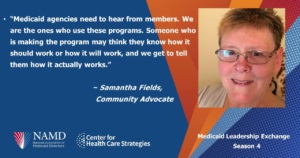Current State: A View From the Inside
A message from NAMD Executive Director Kate McEvoy about the importance of partner engagement in the Medicaid unwinding
Author
- Kate McEvoy
Focus Areas
Our shared work with and for people served by Medicaid continues to demand both head and heart on a daily basis. If the pandemic gave us any true learning, it is the importance of empathy in selecting, designing and implementing policy. We are all also relentlessly focusing on ensuring that people can easily access the program, retain their coverage, and receive the comprehensive, high-quality services that they need.
Working in partnership with so many of you, our membership – Medicaid leaders in every state and territory – is advancing each of those important aspects through the unwinding, comment on CMS’ proposed access and managed care rules, and renewed focus on innovation in serving member needs.
Unwinding: Enhanced outcomes through listening, partnership and data
States are strongly aligned with CMS in calling for all interested parties to remain focused on and amplify the unwinding effort.
We are also urging thought and care around drawing conclusions based on early indicators of experience, and continued vigilance at the federal, state and local levels – not just around the Medicaid redetermination process, but also how well we are collectively doing in connecting people who are no longer eligible for the program to the marketplace or employer-sponsored insurance.
As we commented recently:
- The unqualified focus for states and territories is supporting all eligible people in retaining Medicaid.
- States and their many partners are engaging in unprecedented levels of outreach to current members.
- Apples-to-apples comparisons among states are challenging because the manner in which states opted to prioritize the coverage groups that they are redetermining varies. Some are starting with people they have determined to be ineligible or who have other coverage. Others are aligning with cyclic renewal dates.
- Procedural termination statistics include a range of scenarios, from people who do not respond because they are aware they are ineligible or have another source of coverage to people who remain eligible and have not responded to outreach from states.
- States are required to observe extensive procedural protections for people at risk of losing coverage, including, for some, a 90-day reconsideration period.
- Medicaid remains open on a rolling basis for re-enrollment.
State Medicaid directors are directly and personally involved with unwinding. It’s Kevin Bagley in Nebraska, regularly talking to members in his call center. It’s Lisa Lee, making a whistle stop tour across Kentucky in her department’s CHIP car. It’s active partnerships with stakeholders, as embodied by Liz Matney in Iowa, who was recently recognized as “Relentless Advocate of the Year” by the Iowa Association of Community Providers (IACP).

And not least, it’s the amazing learning that we all gain from members speaking directly to their own experience, values and preferences – such as in this great Medicaid Exchange Leadership podcast, developed by NAMD and the Center for Health Care Strategies through support from the Robert Wood Johnson Foundation. If you haven’t already, I hope that you will take a few minutes to hear Gretchen Hammer’s conversation with Medicaid member and advocate Samantha Fields. Ms. Fields has enormously important advice for states about creating a level playing field and true engagement for consumer advocate members of advisory bodies. She also captures so much in saying, “we look at state data and say, that’s my life you’re talking about.”

CMS Rules: A watershed moment to advance
NAMD’s membership also recognizes that this moment represents an opportunity to improve access to needed services and supports. CMS’s issuance of companion rules, which focus on rate transparency, defining what constitutes timely access to specified services, transparency of rate schedules, member and stakeholder engagement in development of rates, and particular attention to ensuring that older adults and people with disabilities receive the home and community-based services on which they rely, gives states a framework to which to respond. On behalf of its membership, NAMD expects to submit detailed comments on the particulars of the rules, but also to the proposed timelines for implementation. In light of all of the obligations that Medicaid programs are under right now with the unwinding, it is exceptionally important to give them, their managed care plans and enrolled providers the lead time and bandwidth to plan for and implement the process and systems changes that will be required to achieve the aims of both rules.
Innovation
Over and above the significant body of work that they are handling as Medicaid programs emerge from the pandemic, directors are resuming momentum and progress in care delivery and payment reform. This is taking many forms. It’s the first-out-of-the-gate states on HRSN work – not just California and Massachusetts but all of the states in the 1115 pipeline with proposed justice waivers. It’s Lee Grossman in Wyoming, bringing long-term services and supports expertise and a deep commitment to person-centeredness to his program leadership. It’s the five recent graduates of the Center for Health Strategies Medicaid Leadership Institute (Sarah Aker of South Dakota, Juliet Charron of Idaho, Jacey Cooper of California, Jennifer Strohecker of Utah, and Gui Woolston of Connecticut), each of whom took on a major programmatic project as part of an intense year of learning and connection, and several of whom did this in their early tenure as directors.

Sarah Aker, Juliet Charron, Jacey Cooper, Jennifer Strohecker, Gui Woolston
In each of these areas – unwinding, review and comment on CMS rulemaking, and innovation – our membership is grateful for your continued support, insights and ingenuity. Let’s continue to be in close communication around shared issues of interest and concern.
In partnership,
Kate
Related resources
Listening, Learning, Leading: Stakeholder-Driven Change in Medicaid
Kelly Cunningham Q&A: Reflections from Illinois’ Retiring Medicaid Director
Stay Informed
Drop us your email and we’ll keep you up-to-date on Medicaid issues.